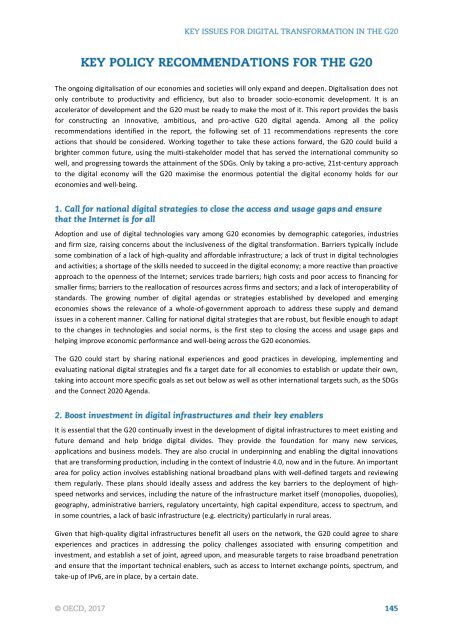KEY ISSUES FOR DIGITAL TRANSFORMATION IN THE G20
2jz0oUm
2jz0oUm
Create successful ePaper yourself
Turn your PDF publications into a flip-book with our unique Google optimized e-Paper software.
The ongoing digitalisation of our economies and societies will only expand and deepen. Digitalisation does not<br />
only contribute to productivity and efficiency, but also to broader socio-economic development. It is an<br />
accelerator of development and the <strong>G20</strong> must be ready to make the most of it. This report provides the basis<br />
for constructing an innovative, ambitious, and pro-active <strong>G20</strong> digital agenda. Among all the policy<br />
recommendations identified in the report, the following set of 11 recommendations represents the core<br />
actions that should be considered. Working together to take these actions forward, the <strong>G20</strong> could build a<br />
brighter common future, using the multi-stakeholder model that has served the international community so<br />
well, and progressing towards the attainment of the SDGs. Only by taking a pro-active, 21st-century approach<br />
to the digital economy will the <strong>G20</strong> maximise the enormous potential the digital economy holds for our<br />
economies and well-being.<br />
Adoption and use of digital technologies vary among <strong>G20</strong> economies by demographic categories, industries<br />
and firm size, raising concerns about the inclusiveness of the digital transformation. Barriers typically include<br />
some combination of a lack of high-quality and affordable infrastructure; a lack of trust in digital technologies<br />
and activities; a shortage of the skills needed to succeed in the digital economy; a more reactive than proactive<br />
approach to the openness of the Internet; services trade barriers; high costs and poor access to financing for<br />
smaller firms; barriers to the reallocation of resources across firms and sectors; and a lack of interoperability of<br />
standards. The growing number of digital agendas or strategies established by developed and emerging<br />
economies shows the relevance of a whole-of-government approach to address these supply and demand<br />
issues in a coherent manner. Calling for national digital strategies that are robust, but flexible enough to adapt<br />
to the changes in technologies and social norms, is the first step to closing the access and usage gaps and<br />
helping improve economic performance and well-being across the <strong>G20</strong> economies.<br />
The <strong>G20</strong> could start by sharing national experiences and good practices in developing, implementing and<br />
evaluating national digital strategies and fix a target date for all economies to establish or update their own,<br />
taking into account more specific goals as set out below as well as other international targets such, as the SDGs<br />
and the Connect 2020 Agenda.<br />
It is essential that the <strong>G20</strong> continually invest in the development of digital infrastructures to meet existing and<br />
future demand and help bridge digital divides. They provide the foundation for many new services,<br />
applications and business models. They are also crucial in underpinning and enabling the digital innovations<br />
that are transforming production, including in the context of Industrie 4.0, now and in the future. An important<br />
area for policy action involves establishing national broadband plans with well-defined targets and reviewing<br />
them regularly. These plans should ideally assess and address the key barriers to the deployment of highspeed<br />
networks and services, including the nature of the infrastructure market itself (monopolies, duopolies),<br />
geography, administrative barriers, regulatory uncertainty, high capital expenditure, access to spectrum, and<br />
in some countries, a lack of basic infrastructure (e.g. electricity) particularly in rural areas.<br />
Given that high-quality digital infrastructures benefit all users on the network, the <strong>G20</strong> could agree to share<br />
experiences and practices in addressing the policy challenges associated with ensuring competition and<br />
investment, and establish a set of joint, agreed upon, and measurable targets to raise broadband penetration<br />
and ensure that the important technical enablers, such as access to Internet exchange points, spectrum, and<br />
take-up of IPv6, are in place, by a certain date.


